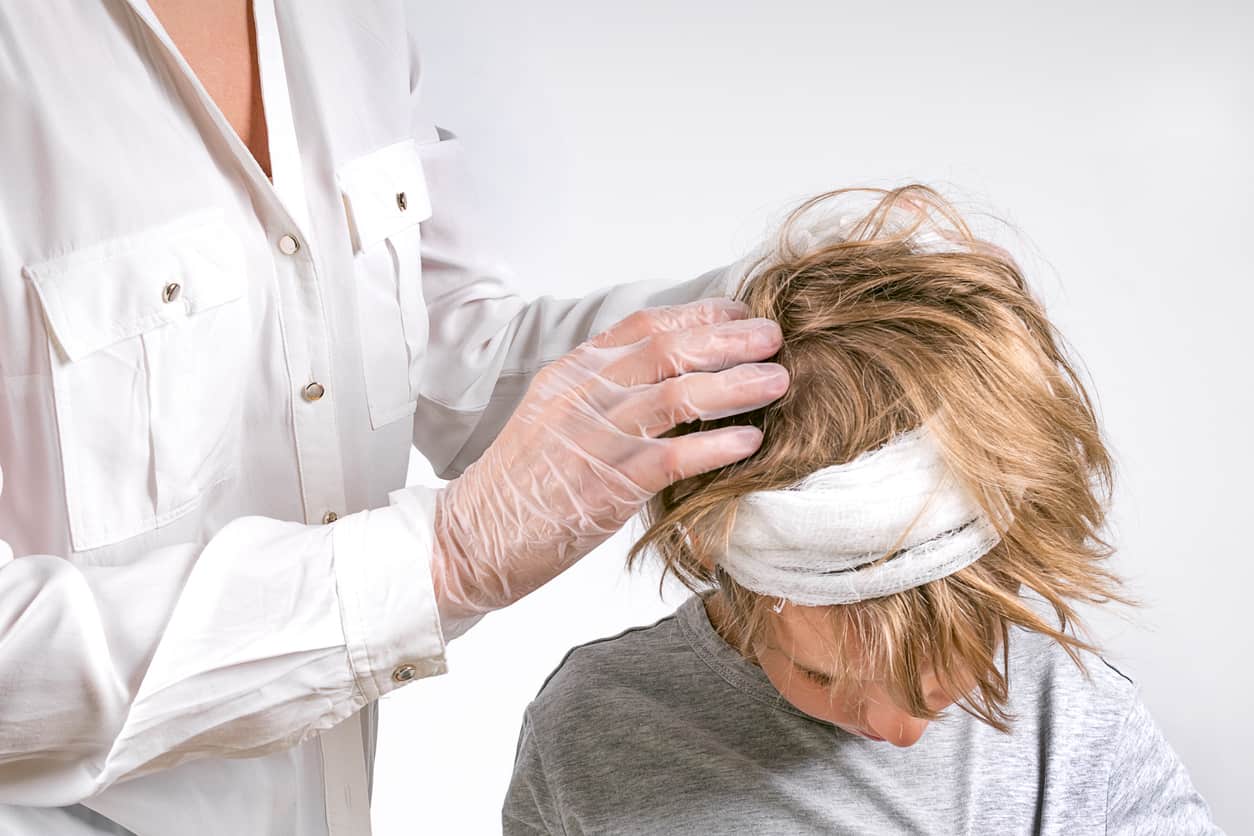March is Brain Injury Awareness Month! This month, we’re focusing on ways to keep our bodies’ most important organ safe and healthy.
Brain injuries can fall into two categories: traumatic and non-traumatic.
Traumatic brain injuries are caused by an external force that injures the brain. Falls, assaults, car accidents, sports injuries, and other blunt trauma incidents can all cause traumatic brain injury. Concussions are a common example of traumatic brain injury.
Traumatic Brain Injury Symptoms
Mild symptoms include:
- Headache
- Nausea or vomiting
- Drowsiness or fatigue
- Speech difficulties
- Loss of balance or dizziness
- Blurred vision, ringing in the ears, a bad taste in the mouth, or changes in the ability to smell
- Sensitivity to light or sound
- Loss of consciousness from a few seconds
- A state of being dazed, confused, or disoriented
- Memory or concentration problems
- Mood changes
- Depressed or anxious feelings
- Difficulty sleeping or sleeping more than normal
Moderate to severe symptoms include:
- Loss of consciousness from several minutes
- Persistent headache or headache that worsens
- Repeated vomiting or nausea
- Convulsions or seizures
- Dilation of one or both pupils
- Loss of coordination
- Profound confusion
- Coma
It’s important to receive medical care if you are experiencing any symptoms, or a blow to the head has occurred. A mild traumatic brain injury still qualifies as serious and should be evaluated by a healthcare professional. According to the Brain Injury Association of America, over 144,000 Texans sustain a traumatic brain injury every year, and over 5,700 Texans are permanently disabled every year from a traumatic brain injury. Seeking medical treatment quickly can help prevent long-term damage.
Non-traumatic brain injuries are caused by internal damage, such as lack of oxygen, exposure to toxins, and more. Injuries include strokes, near-drownings, tumors, aneurysms, and more.
Non-Traumatic Brain Injury Symptoms
- Constant headaches
- Fatigue and body weakness
- Paralysis
- Persistent seizures or tremors
- Sensitivity to light
- Loss of consciousness
- Speech difficulties
- Memory loss
- Loss of concentration
- Shortened attention span
- Pain sensitivity
- Smell and taste disorientation
- Tough, vision, and hearing disorientation
It’s very important to seek medical treatment if you notice these non-traumatic brain injury symptoms. Non-traumatic brain injuries are caused by internal damage, so medical examination and treatment is often needed to treat the underlying cause.
Because internal factors cause non-traumatic brain injuries, you might not have an obvious event that causes you to look for symptoms (e.g., a brain tumor could be causing memory loss and vision disorientation, but if you don’t know about the brain tumor, you might not recognize these as symptoms). So, it’s extra important to be aware of brain injury symptoms and be on the lookout for them.
Diagnosis and Treatment
If you think you have sustained a brain injury or have any symptoms of a brain injury, it’s important to seek medical care. For less severe head injuries, such as a minor concussion, doctors can use a series of questions and tests to diagnose the brain injury. For more severe brain injuries, doctors use imaging tests, such as CT scans and MRIs, to make a diagnosis and look for any underlying causes. Treatment is based on the severity of the injury sustained. For minor injuries, the best treatment is rest and over-the-counter pain relievers. Rest should include both physical and mental rest to give the brain a chance to recover. Doctors will provide more acute care for severe brain injuries, focusing on maintaining blood and oxygen levels, preventing further damage, and treating other injuries. Severe brain injuries may require stronger medications, surgery, and rehabilitation.
Ally Medical Emergency Rooms are equipped with X-rays, CT scans, and Ultrasounds to provide fast results and help in accurate diagnoses. Our emergency rooms can provide short-term observation for up to 23 hours and have hospital transfer agreements if a patient needs to be transferred for a more extended stay, surgery, or other higher acuity needs. Ally Medical operates six freestanding emergency rooms in Texas with locations in Bastrop, South and Central Austin, Clear Lake, Round Rock, and Spring. No appointments are needed, and patients may come in at any time–day or night–with little to no wait. If you need immediate medical attention, visit any Ally Medical facility to experience our re-envisioned medical care.
Resources
https://www.mayoclinic.org/diseases-conditions/traumatic-brain-injury/symptoms-causes/syc-20378557
https://brooksrehab.org/conditions/brain-injury/types/non-traumatic/



